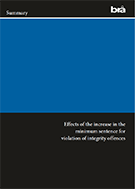- Start
- / Home
- / Publications

Effects of the increase in the minimum sentence for violation of integrity offences
Summary of the memorandum Effekter av straffskärpningen för fridskränkningsbrott (in Swedish)
The amendment of the provision regarding gross violation of a woman's integrity resulted in more stringent minimum penalties and an expansion of the types of acts that can together constitute a gross violation of integrity.
The offences of gross violation of integrity and gross violation of a woman's integrity were introduced into the Swedish Penal Code in 1998 in order to combat violence in domestic relationships. The provision regarding gross violation of a woman's integrity applies to repeated violent offences, threat offences, or sexual offences which are perpetrated by a man against a woman with whom he is, or has been, married or with whom he cohabits or has cohabited. Gross violation of integrity refers to the same type of criminal offences, but when directed against another type of closely-related person, such as a parent, child, sibling, or male partner.
An amendment to the provision which entered into force on 1 July 2013 entailed an increase in the minimum penalty for these offences from six months' imprisonment to nine months' imprisonment. The Government's justification for the increase was that the nine-month minimum prison sentence would constitute a better reflection of the penal value of these offences. It was also argued that an increase in the minimum penalty would lead to a general increase in the penalty level for the offences, which was regarded as desirable.
The National Council’s assessment
- A first conclusion of the study is that the amendment of the provision does not appear to have had any major impact on the distribution of the various types of principal sanction imposed in convictions for violation of integrity offences. However, a certain increase can be observed in the proportion of persons found guilty of the offence who are sentenced to prison, a proportion that was already relatively high prior to the amendment.
- The second conclusion is that, as anticipated, the proportion of those sentenced to prison who have been sentenced to at least nine months' imprisonment has increased significantly following the increase in the minimum sentence.
- The third conclusion is that the sentences for the majority of those sentenced to prison for violation of integrity offences have as a rule became longer following the increase in the minimum sentence. These results may be regarded as being consistent with the intentions behind the amendment.
Fakta om publikationen
© Swedish National Council for Crime Prevention 2018
Author: Jonas Ring
urn:nbn:se:bra-802

